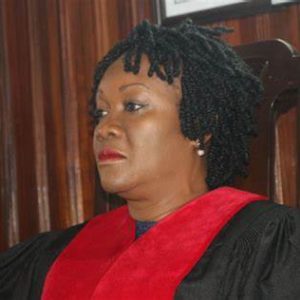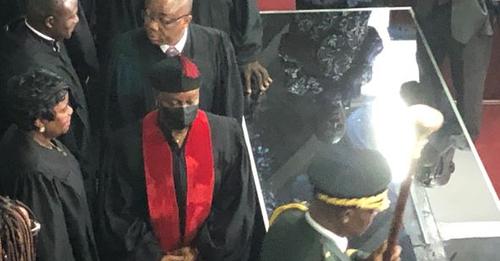FLASHBACK: Chief Justice Sie-A-Nyene Yuoh during the formal opening of the Supreme Court recently
By Garmah Never Lomo, garmahlomo@gmail.com
TEMPLE OF JUSTICE, Monrovia- Many legal luminaries who preferred not to be named have taken issue with the new Chief Justice, Sie-A-Nyene Yuoh for “illegally” suspending Judge Sikajibo Wollor.

The new Chief Justice’ move, which the legal luminaries say should not have been taken by her unilaterally but by the full Bench of the Supreme Court, told this Reporter that “her action is violation of the Liberian constitution”, a decision that was taken just days after she was formally seated and declared that she will uphold the rule of law.
The Lawyers cited Articles 73, 43 and 20 of the Liberian constitution of 1986.
Article 73
“No judicial official shall be summoned, arrested, detained, prosecuted or tried civilly or criminally by or at the instance of any person or authority on account of judicial opinions rendered or expressed, judicial statements made and judicial acts done in the course of a trial in open court or in chambers, except for treason or other felonies, misdemeanor or breach of the peace. Statements made and acts done by such officials in the course of a judicial proceeding shall be privileged, and, subject to the above qualification, no such statement made or acts done shall be admissible into evidence against them at any trial or proceeding.”
Article 43
The power to prepare a bill of impeachment is vested solely in the House of Representatives, and the power to try all impeachments is vested solely in the Senate. When the President, Vice President or an Associate Justice is to be tried, the Chief Justice shall preside; when the Chief Justice or a judge of a subordinate court of record is to be tried, the President of the Senate shall preside. No person shall be impeached but by the concurrence of two-thirds of the total membership of the Senate. Judgements in such cases shall not extend beyond removal from office and disqualification to hold public office in the Republic; but the party may be tried at law for the same offense. The Legislature shall prescribe the procedure for impeachment proceedings which shall be in conformity with the requirements of due process of law.
Article 20
No person shall be deprived of life, liberty, security of the person, property, privilege or any other right except as the outcome of a hearing judgment consistent with the provisions laid down in this Constitution and in accordance with due process of law. Justice shall be done without sale, denial or delay; and in all cases not arising in courts not of record, under courts-martial and upon impeachment, the parties shall have the right to trial by jury.
On October 13,2022, new Chief Justice Yuoh suspended with immediate effect the assignment of his Honor Sikajibo A. Wollor from presiding over the 5th Judicial Circuit Court in Grand Cape Mount County for this November A.D. 2022 term of court.
Justice Yuoh’s decision was predicated upon a complaint of alleged ethical misconduct of the judge which is of a grave magnitude.
It is also a violation of the doctrine of presumption of innocence of an accused which states “A defendant in a criminal action is presumed to be innocent until the contrary is proved; and in case of a reasonable doubt whether his guilt is satisfactorily shown, he is entitled to an acquittal,” the well-placed legal critics added.
Speaking when she was seated on October 10, 2022, her honor Chief Justice Yuoh declared in front of President George Weah and other top government officials, Lawyers, Judges and other personalities seated in the Supreme Court: “I owe no allegiance to no one but to the constitution of the Republic of Liberia.”
Chief Justice Yuoh, according to the Legal luminaries who spoke to this news outlet, did not have any legal authority to suspend a judge.
Some said, the judge should have been investigated and if found liable, actions could be taken against him than suspending without the outcome of the investigation.
Some even quoted the Liberian constitution of 1986 Article 72 (a) which states
“The Chief Justice and the Associate Justices of the Supreme Court and judges of subordinate courts of record shall be retired at the age of seventy; provided, however, that a justice of judge who has attained that age may continue in of office for as long as may be necessary to enable him to render judgement or perform any other judicial duty in regard to proceedings entertained by him before the attained that
In their analysis, the Article 72 (a) quoted above means that both the Chief Justice and the Judges have the same rights under the law where they all retired at age seventy and they can be appointed by the president and confirmed by the Senate, but the only difference is that the Chief Justice is the administrative head.
The legal rational is that for a Chief Justice to suspend a judge from participating in judicial affairs, when he hasn’t been found guilty is tantamount to suspension through an investigation report from the Judiciary Inquiry Commission, which she doesn’t have the power to do and Not even the President of Liberia can do that.
But the judge whose assignment was suspended said he will go back to his assign court because his suspension has no legal grounds.
However, a judge or his assignment should be suspended based on legal reasons after he or she shall have been investigated on ethical misconduct, the legal luminaries further claimed.
Meanwhile, the complaint against the Judge in question has been forwarded to the Judicial Inquiry commission for a full investigation, whilst Judge Sikajibo Wollor remains suspended from all Judicial functions pending the outcome of this investigation.
At the same time, the new Chief Justice Yuoh has ordered the immediate dismissal of Mr. Webster B. Wreh, Clerk of the Tax court of Montserrado County, following an administrative investigation that found him liable for egregious ethical misconduct unbefitting a staff of the Judiciary.
Justice Youh, the third Liberian female Chief Justice, has replaced former Chief Justice Francis Korkpor, who reached resigned at the end of September because he had reached the constitutionally required age limit of 70 for members of the Supreme Court Bench.

